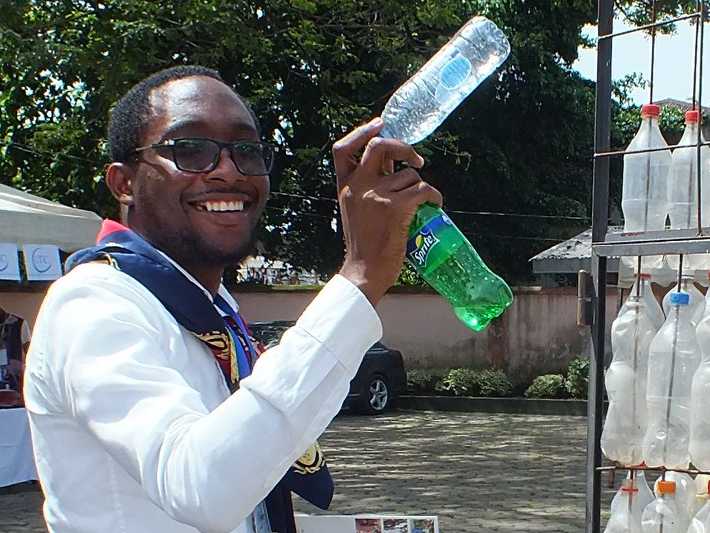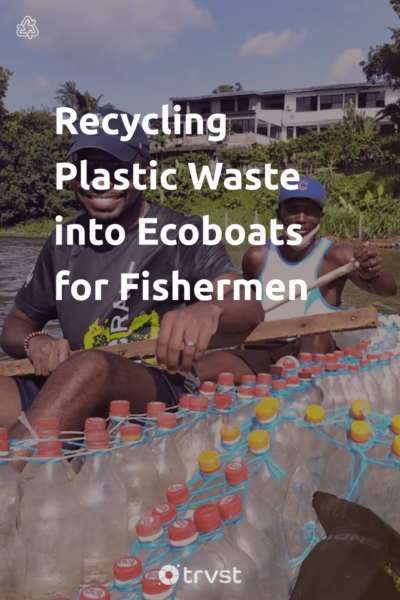Recycling Plastic Waste into Ecoboats for Fishermen
Describe Ecoboats for Fishermen - what makes your project unique?
Madiba & Nature has launched its program to involve fishermen in the sustainable management of coastal fisheries through community mobilization around the recycling of marine plastic waste since 2017.
The organization focuses its program around three major projects in order to have a significant impact and boost the blue economy in the country:
Recycling plastic waste into Ecoboats, aims to make ecological canoes out of plastic bottles. These Ecoboats are affordable and are targeting vulnerable communities. To achieve this, Madiba & Nature has invented an ecological garbage can called Ecobin, which enables it to set up an innovative system for selective sorting of plastics in cities and on beaches. An Ecobin allows the collection of more than 1000 plastic bottles from households, thus limiting marine pollution.
This project is also the part that energizes communities in fishing villages through the organization of beach cleanup campaigns, and the diversification of household incomes through the sale of plastics as raw materials. Riparian communities organized in association ensure the collection and storage of marine plastics which are sold to Madiba & Nature for the production of Ecoboats used for fishing and ecotourism on the beaches. Thus, nearly 5 tons of plastic waste is collected through 150 Ecoboats installed in the cities of Kribi and Douala. Forty-five Ecoboats have already been manufactured and are used by more than 150 fishermen and by the ecotourism sectors in Kribi and Londji.
The second project is the promotion of ecotourism. In three years, Ecoboats has become the vector of tourism development in the cities and beaches of South Cameroon. Thus, Madiba & Nature ensures the reinforcement of the capacities of the associations of fishermen tourist guides. This contributes to the promotion of natural landscapes and encourages the conservation of biodiversity. Bookings are made through different social networks and the organization's website. Nearly 300 visitors are registered each year, increasing the household incomes of 20 fishermen and their wives to over US$300 per month.
The third project is the organization and promotion of environmental education and the accentuation of consideration of environmental issues by public opinion and the Cameroonian authorities. To reach this goal, Madiba & Nature has created an environmental education module that operates in 12 High Schools and colleges and 2 universities in Douala and Kribi. The program consists of environmental awareness courses and educational talks that take place once a term per school, and which sensitize both students and teachers.
The program also consists of the organization of an environmental awareness seminar, which brings together more than 1000 students once a year per college. With the universities, the organization launched in 2019 its Green Business Leadership in Entrepreneurship program, which is taken online and on-site in Douala. Here, young graduates and non-graduates are trained in recycling in particular and green business in general.
Madiba & Nature now operates with a team of 11 permanent staff and about 30 temporary volunteers. The project takes place simultaneously in 3 cities and impacts more than 1,000,000 people each month.

Why does the world need your project?
Cameroon is particularly threatened by climate change. Owing to population growth and increasing urbanization, the harmful effects of plastic pollution make life almost impossible for millions of people, while threatening marine life and destroying fisheries. Madiba & Nature was funded to help preserve the livelihoods of fishermen while also addressing the issue of marine plastic pollution. Plastics are collected through beach cleanup activities and used to create Ecoboats for fishermen. Our strategy is about expanding the use of Ecobins through the installation of the first innovative system of waste management on beaches and cities to limit pollution and promote green businesses.
With around 150 Ecobins, up to 5 tons of plastic waste are collected each month allowing 50 Ecoboats to be built and used by 150 fishermen and ecotourists in Londji. To date, ecotourism has created 15 jobs within the Londji community. 15 youths are trained every year in our Entrepreneurship in Green Business Mentoring Program.
What inspired you to start?
My dad's a fisherman and his dad before him was a fisherman too. We are Sawa which means the people of the water. I learned to fish when I was a child, but as I grew up I saw this work decline to the point where nowadays in families, children are born with a different orientation of professional life. Plastic has become the more invasive species of fisheries.
I founded Madiba & Nature in 2016 as an organization that promotes sustainable development with the main goal of improving the livelihood of fishermen and the communities exposed to the harmful effects of climate change.
Nearly 250,000 people in Cameroon directly depend on fishing according to the World Food Program, however, with the rise of pollution and plastic in fisheries and the ocean, their future is threatened. As there is no serious national program to tackle these issues and help local communities affected to build a strong resilience to climate change, I chose to be the one fishermen in need they could rely on.
What have you achieved so far?
The Madiba & Nature initiative has impacted the fisheries of Kribi, Londji, and Douala with the provision of 50 Ecoboats used by 150 fishermen and tourist guides. Since the beginning of 2020, ten other Ecoboats have been added to reach 180 fishermen.
From the selective and sorting system in waste management, Madiba & Nature is now managing 150 Ecobins for a quantity of 60 tons of plastic waste annually. For 2020, through a planned partnership with urban councils and city halls, Madiba & Nature has added 100 Ecobins and created 250 Ecobins in 3 cities, collecting an additional 10 tons of plastic waste in these communities.
The Capacity building and training program of Madiba & Nature is now impacting an average of 40 people per year, with a goal to reach 50 fishermen and women in villages by the end of 2020. From next year we are targeting 100 people to be trained each year to reach a total of around 450 people.
How can people get involved in your project or help out?
People around the world can support our project by making donations through our crowdfunding link, allowing us to continue our actions in the field; https://www.givingway.com/donate/madiba--nature?fromGWWidget=true
They can fund our project: https://www.givingway.com/organization/madiba--nature?context=projects
Helping us meet with donors of development and environmental projects, you can recommend us to the relevant institutions in your country or internationally.
By registering as a volunteer to participate in our environmental education and awareness-raising on cleanup and recycling of plastic bottles into Ecoboats. Assisting with scientific research (writing protocols and scientific articles on marine research), fundraising, crowdfunding; distance learning in entrepreneurship and project management; web design via this link:
https://www.givingway.com/organization/madiba--nature?context=Online_Volunteering
What are your plans for the future?
Madiba & Nature will use the innovative sorting system of plastic waste based on 200 Ecobins in Douala and Kribi and increase the plastic collected from 3 tons to 6 tons each month and add incomes to around 33% from waste processing.
• The areas of beaches and City Rivers will look 70% cleaner in the areas covered by the project
• 100 Ecoboats will be added to the 45 actually used in the fisheries, helping at least 200 fishermen
• 20 Young fishermen will gain capacity building in tour guiding
• 20 Women will gain capacity building in the recycling and craft valorization of plastic
• 15 secondary schools and a university will link to the environmental education program
• The volunteering and internship program will allow work with more than 30 students and youths who will be trained and receive capacity building for at least six months
• The online sensitization and newsletter will allow us to teach and sensitize more than 1 000 000 followers
• A monthly report of activities and annual report will evaluate and record the goals reached by the end of the project.
• National and international TV/radio and newspapers will cover at least one of the projects and impact millions of viewers and subscribers.
What's the one piece of advice you'd give an aspiring change maker?
Do what you love and love what you do; work hard till the end!

